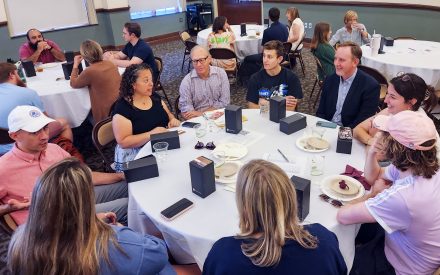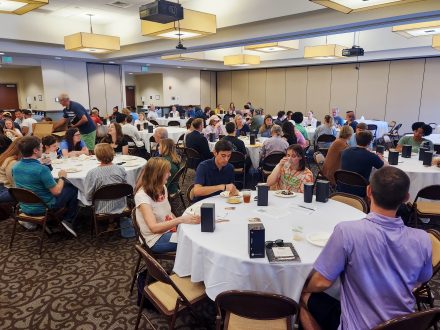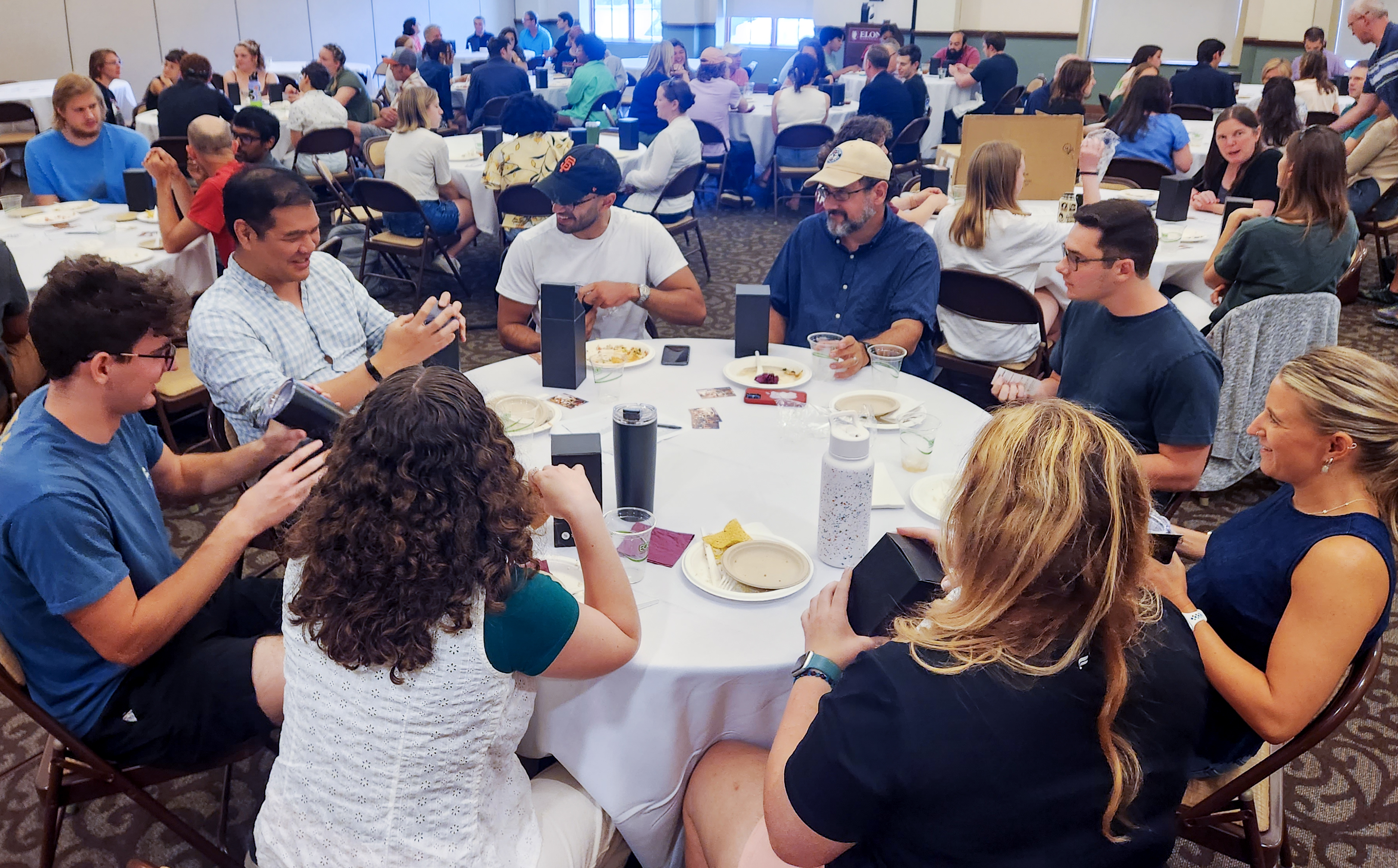Members of 45 research teams of undergraduates and faculty mentor in Elon's Summer Undergraduate Research Experience program met this week to reflect on work completed and prepare for poster presentations July 19.
Students and faculty involved in 45 Summer Undergraduate Research Experience (SURE) projects gathered in Lakeside Upstairs on Tuesday, June 27, to mark the midpoint of the eight-week program, check in with each other and share resources.
Around the room and across disciplines, students and faculty talked through common hurdles, shared additional sources of information and processed the impact the experience is already having on their academic and career pursuits.
“It was super helpful,” said biology major Frieda Walsh-Seaman ’24, who is studying the effects of hormonal birth control on heart rate variability with Associate Professor of Biology Robert Vick. By chance, she sat at a table with exercise science major Katie Lowe ’24, who is researching the effects of estrogen, progesterone and cortisol in athletic performance with Professor of Exercise Science Caroline Ketcham.
“We talked about our research and exchanged information with each other,” Walsh-Seaman said. “I think it widened our spectrum. Maybe I’m able to include athletes into my study and see how their hearts are changing.”
“And she’s going to share some articles with me, which I’m sure will be helpful,” Lowe added.

SURE is the signature program Elon offers undergraduates and mentors to devote time and resources to research in fields they are passionate about. Summer offers the opportunity to progress work without the distractions of campus life during the academic year. SURE provides students a $3,000 stipend for full-time work with faculty on projects that can extend across multiple years and lead to publications and conference presentations.
“The conversations that happen around research matter. A lot of times, people doing research are in silos and don’t get the opportunity to talk with others, and it’s important to have these conversations and check in with each other to see how things are going,” said Eric Hall, professor of exercise science and director of Undergraduate Research. “We see the glamor of the poster or the publication, but we don’t see the story of research and how you get there.”
A new page in that story is being written this summer. A team of faculty and undergraduates formed a mentoring pod to support seven projects involving research abroad — England, India, Poland — in different U.S. regions and ethnographic study. Each day, researchers share posts with each other about their progress and experiences, as well as feedback and advice.
Professor of Religious Studies Brian Pennington and Professor of Religious Studies Amy Allocco piloted the model last summer while mentoring several students conducting field research in far-flung locations. This year, Lecturer in English Kathleen Crosby, Assistant Professor of History Waseem Kasim, Associate Professor of Geography Sandy Marshall and Assistant Professor of Religious Studies Andrew Monteith and their mentees are sharing in the model.
“Wherever they are in the world, whatever their research is having them do, they post updates, and the mentors do, as well,” Allocco said. “So, it’s a lot of peer mentoring and peer support along with the faculty level of mentoring. It’s about creating a constellation of mentors.”
 Prompts provided by the Center for Engaged Learning led to deep discussions about successes, challenges and avenues to advance projects the rest of the summer and beyond.
Prompts provided by the Center for Engaged Learning led to deep discussions about successes, challenges and avenues to advance projects the rest of the summer and beyond.
Noah Dyson ’24 and Khairi Morrow ’25 discussed their work, each involving wellbeing in the Black community. Dyson, a psychology major, is researching disparities in mental health services between Black and White men with Associate Professor of Public Health Studies Stephanie Baker. Morrow, a dance science and public health studies double major, and Assistant Professor of Dance Keshia Wall are researching the cardiovascular and mental health benefits of West African dancing among Black women.
Both said SURE helped them “lock in” on subjects they are passionate about, as Dyson put it, and connect their studies more directly to their career ambitions. Research has made Dyson more passionate about becoming a clinician to serve underserved populations. Morrow wants to pair dance education and physical therapy and hopes to one day found a physical therapy hospital.
“SURE has opened my eyes to see that research isn’t scary,” Morrow said. “When you’re a first-year coming in, I was afraid of it and didn’t think I would want to be involved in it. But being in it, especially as a Black girl being in it and the type of project that I have, has shown me that it’s for everybody. You just have to go on and do it and make it your own.”
Undergraduates will present posters about their SURE projects in two consecutive sessions July 19, from 9 a.m. to noon in McKinnon Hall.



